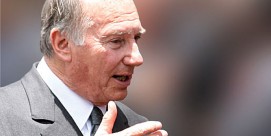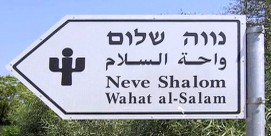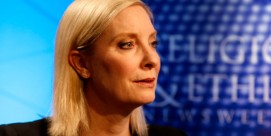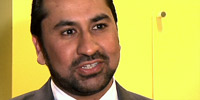In This Episode << SLIDE LEFT TO SEE ADDITIONAL SEGMENTS
Religious Reactions to Anti-US Protests in the Muslim World
BOB ABERNETHY, host: Joining me now to talk about some of the major news of the week are Kim Lawton, managing editor of this program, and Kevin Eckstrom, editor-in-chief of Religion News Service. So, Kevin, a fourteen-minute video is posted on YouTube and triggers violence all over the Muslim world, demonstrations resulting in the death of the U.S. ambassador to Libya. What are the messages from all that, especially the religious messages?
KEVIN ECKSTROM (Editor-in-Chief, Religion News Service): Well, I think, you know, we live in this increasingly smaller world, interconnected world, and things that happen in one place instantaneously affect things in another place, and religion obviously is playing a larger and larger role in global affairs, and what you’ve seen, I think, this week is that one of the greatest barriers to interfaith understanding is actually technology and the ability to get these messages out. You know, five years ago, ten years ago, somebody could have made a video like this and nobody ever would have seen it, but now you can post it on YouTube or you can put it on Twitter or Facebook, and it’s around the world instantaneously, and it automatically pits one religion against another, and that’s a huge challenge that nobody, I think, has quite figured out how to deal with just yet.
KIM LAWTON (Managing Editor, Religion & Ethics NewsWeekly): And it was interesting watching some of the debate within the religious community, because there was sort of a little difficulty over the emphasis, and a lot of the interfaith leaders blamed the video, and you know, really were harsh on the video in saying it provoked all of this, and then other people were saying well wait a minute, what’s the responsibility of the people who were perpetrating all the violence, and what responsibility do they have and, you know, there was talk even in political circles, were people too sympathetic towards those doing violence, and even if you don’t like a video or even if it’s offense to your religion, is it justified, or even if you try to understand why the violence was committed, how strongly do you, you know, blame the video versus blaming the violent behavior?
ABERNETHY: And it shows the volatility in the Muslim world and the enormous role and passion that goes along with the religion.
ECKSTROM: Right, this is sort of a crash course for a lot of people into Islam again. But also, you know, why depictions of the Prophet Muhammad are so problematic, and why Muslims are so sensitive about that, and it shows that, you know, this is not just a religious question, but whenever you are dealing with the Muslim world that religion and politics are intermarried and one thing is going to affect the other, so this is not just about Christians versus Muslims or Jews versus Muslims. I mean, this is about Egypt versus the United States. It takes on a whole new meaning when you get into this arena.
ABERNETHY: And many of them apparently don’t have much of an understanding of the role of free speech in this country.
LAWTON: Well, this has been a big international debate. I was actually at a conference a couple years ago with journalists talking about this notion of defamation of religion and should it be criminalized. There’s been a movement in the U.N. to actually make it a crime to defame someone’s religion and a lot of people don’t see insulting someone’s religion as free speech, and we might say here in the United States, well ,I don’t like that but that’s free speech, but in other contexts they see religion as something different, and it’s not free speech in their minds to do something offensive but, you know, for us the question becomes, well, who makes that determination, and what’s offensive to me may not be offensive to you.
EKSTROM: And there was, you know, I was really struck watching the video coming out of Cairo and the people in the streets were saying Obama knew about this, you know, Obama could have stopped this video, he has the best intelligence agency in the world, and he could stop this video, and he has to put an end to this. Well, he can’t do that at all. And so there’s this large gap that I think we’ve seen this week exposed between sort of the Western notions of freedom of speech, freedom of press, and the same notions in the Muslim world that are just vastly different.
ABERNETHY: And you can’t stop it, but religious leaders, both Muslims and Christians and others in this country, can come out very strongly, as some of them did this week, saying no, don’t demonize anybody else’s religion.
LAWTON: That was certainly one message we heard from the interfaith community, urging their members, don’t, you know, put out things that might stoke tensions. I was also surprised to see and interested to watch some of the reaction in the Muslim community. While many Muslim leaders certainly didn’t like the video and denounced the video, I did hear some pretty strong statements directed at their own community. I mean, the Muslim Public Affairs Council released a statement saying we look to our Muslim leadership to reflect on how we’ve come to such an extreme point in our own community as well.
ABERNETHY: Kim Lawton and Kevin Eckstrom, many thanks to you both.
ECKSTROM: Thanks.







